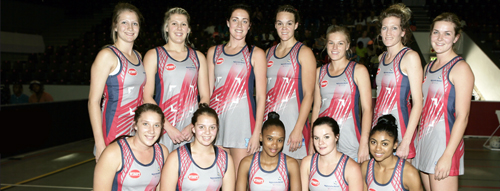
The Kovsie Netball side is well underway to hold onto their champion status in the Varsity Netball Championships. On Monday evening, 13 October 2014, they beat NWU-Pukke 51–45 in the semi-final that took place on our Bloemfontein Campus.
The ladies from the UFS established a comfortable lead early on. Despite a strong comeback effort from NWU, Kovsies ended the game as conquerors with their second consecutive final ahead of them for next Monday.
Our team could hardly ask for better supporters, as the crowd roared them on to a winning score. They made the most of every attacking opportunity on court and played an offensive match. This was especially evident during the power plays – a period of time during which each goal is worth two points.
NWU-Pukke managed to fight their way back, coming within a goal of their hosts. But Kovsies went into a well-earned 10–6 lead during the first break. Kovsies’ Danelle Willemse and Ane Botha impressed with their accuracy at the hoop and clinically-executed shots at goal. At half-time, Kovsies had built up to a 27–14 lead.
The home side was in complete control of the game as they went into the final break with the scoreboard at 43–31. NWU’s effort fell short in the last quarter, though, and they could not snatch the victory from the defending Kovsie champions.
Kovsies will face the Tuks team in Pretoria on Monday 20 October at 18:45 for the final of the 2014 Varsity Netball tournament.